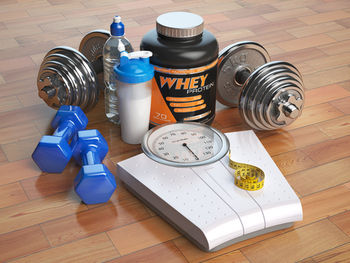- Home
- Blog
- Conditions
Whey Protein guide: All Things You Should Know
Conditions
Whey Protein guide: All Things You Should Know
By Apollo 24|7, Published on- 08 July 2022, Updated on -18 October 2022
Share this article
0
0 like

No matter whether you are a fitness enthusiast, athlete or any other normal individual, each one of us requires nutrients for the healthy growth and development of the body. Major nutrients like carbohydrates, vitamins, minerals, and proteins are essentially required for the optimal functioning of the body. Today we’re going to talk about protein in particular. Protein is widely available in almost every food item, however, the dietary sources may not be able to fulfil the body's requirements. Therefore, other natural alternatives of dietary protein such as whey protein can be added to the daily routine to meet the needs. This blog serves as a definitive whey protein guide taking you through all that you need to know about whey protein.
What is Whey protein?
Whey is the liquid substance left after the milk gets coagulated during the manufacturing of cheese. Edible acids are added to the milk to make it curdled, while the solid part is used for making cheese and tofu, the liquid part is called whey.
Of the total amount of protein found in cow milk, whey comprises 20% of it while the rest of it is casein (another milk protein). Numerous studies have demonstrated that whey protein and its constituents amino acids (leucine) promote protein synthesis in the muscles and aid faster recovery after a workout.
Types of Whey Protein
Essentially whey comes in 3 forms; Isolate, Concentrate and Hydrolyzed. Each of them has its own unique properties and serves a specific function.
- Whey Protein Isolate: It is one of the most efficient ways of supplementing your protein intake as whey protein isolate is 90% protein without any fats and carbs. Therefore, it is advised to consume whey protein isolate immediately after a workout as it is absorbed much faster.
- Whey Protein Concentrate: Another good and affordable choice to supplement your protein supply is whey protein concentrate. Whey protein concentrate still has some of the carbs and fats from the originating milk but it contains 70 to 80% of protein.
- Hydrolyzed Whey Protein: It gets absorbed even faster in the body as because this is a type of isolated protein, where the protein chains have been further broken down. Whey protein hydrolyzed, also known as whey protein hydrolysate is the preferred choice by pro athletes and Mixed Martial Arts (MMA) practitioners.
Benefits of whey protein
Whey protein as a dietary supplement surely contributes to our protein and nutritional needs. But there are numerous other benefits it provides to the body, some of them are mentioned below.
- Supports muscle gain: Whey has essential amino acids such as leucine which help support the growth of muscle mass.
- Promotes faster muscle recovery: Leucine also helps in rebuilding and healing the muscles after a workout session. Furthermore, leucine-rich whey protein helps provide more protein than casein.
- Supports weight loss: Whey protein also helps in the reduction of fat from the body and increases lean muscle mass. Replacing other sources of calories with whey protein along with weight lifting can help you lose a significant amount of weight.

Are there any side effects of whey protein?
Not really. The side effects of whey protein are the same as that of milk, which means anyone allergic to milk or lactose will also be allergic to whey protein. Other than that, milk and whey protein can trigger acne in some consumers. Other than those mentioned above, there are not many side effects of whey protein.

Recommended reading: Whey Is Way Better Than You Think: 5 Myths Debunked
Whey protein has a lot more nutritional benefits than just being a workout supplement. Recent studies have pointed out that whey protein might be beneficial in managing blood sugar in diabetic patients. In such a scenario, whey protein becomes the preferred choice of protein intake for most of us. But with that being said, too much of anything is bad and the excess protein in the body over a long period of time can cause damage to the body. Therefore you should consult your dietician before supplementing your diet with whey protein.
Have more questions?
Consult an Apollo Dietician Now
You can also buy Whey Products from our wide range.
Medically reviewed by Dr Sonia Bhatt.
Services
Conditions
Leave Comment
Services
Recommended for you

Conditions
Ways to tackle asthma symptoms the right way
Battling asthma can be a challenge, but a strategic plan can go a long way. Read to know all about the lifestyle changes that can help you manage asthma.

Conditions
Lemon Juice To Garlic, 8 Things That Can Help Detox Your Body Naturally
From lemon juice to noni juice, karela jamun juice, apple cider vinegar and ginger, here are 8 natural things that can help detox your body naturally and boost your immunity and overall health.

Conditions
Starting Keto Diet? Know Its Benefits And Side-effects First
Keto diet is one of the popular weight-loss diets. Health experts state that the diet offers multiple other benefits as well.
Subscribe
Sign up for our free Health Library Daily Newsletter
Get doctor-approved health tips, news, and more.

